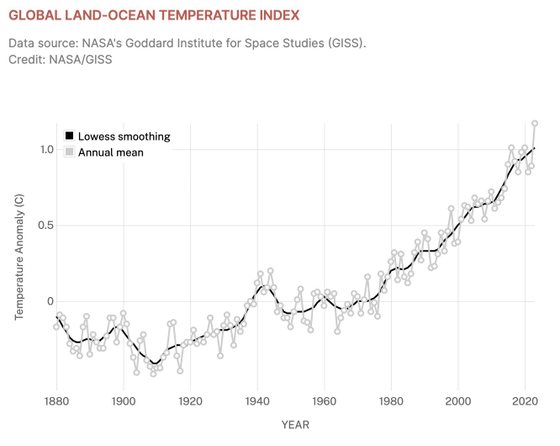A post is circulating on social media claiming that, when it comes to climate change and rising average global temperatures, in 42 years “literally nothing has changed.” “42 years ago CBS told us what the consequences of global warming would be, after four decades, nothing has changed,” reads the post, which accompanies a video that appears to be an excerpt from a CBS newscast from the early 1980s.
This is a news item that reports on the beginning of concern in the scientific community about the fact that the burning of fossil fuels on a global level is contributing to the greenhouse effect and, therefore, to the increase in global temperatures. The report even presents images that illustrate the concern about the melting of ice at the poles and the rise in the average sea water level, which could flood several areas of the planet in the future.
The television piece also shows a scientific explanation of how the greenhouse effect works and even includes statements from Al Gore, calling for more scientific research on the subject.
The publication, however, without presenting any concrete data, distrusts the veracity of climate change, a phenomenon on which the scientific community is unanimous, stating that since the 1980s “literally nothing has changed.” “Did they make a mistake?” the publication asks. “Did you notice that today’s speech is exactly the same? It’s as if they’ve never talked about this before, right? They talk as if it’s new. This speech has been repeated since the late 1970s and year after year everything remains the same.”
The publication, which includes, among others, the hashtag #environmentalfraud, then seeks to give a supposed scientific explanation for the fact that there are currently higher temperatures: “But this year the heat is more intense, someone might say. Yes, this is due to an increase in solar activity, as has been reported throughout the past year. This phenomenon occurs every ten or twelve years, the last time was in 2012, when they said the world was going to end, remember?”
However, this is a publication full of errors, falsehoods and half-truths that have already been widely denied by the scientific community.
First, let’s look at the most definitive claim in the paper: that since the late 1970s, “literally nothing has changed” and “everything remains the same.” This is clearly incorrect information. To understand this, one need only look at such basic indicators as NASA’s climate data on average global temperatures recorded since 1880.
The following graph shows the difference between the average temperature of each year and the average temperature of the period 1951-1980, chosen as a reference period. The graph speaks for itself: between 1880 and 1940, the planet’s temperatures were always below the average of that reference period. The period of the Second World War represents a peak in temperatures, which remained relatively stable until the 1980s. Since the early 1980s, a constant increase in the average temperatures of the planet can be observed: in 2023, the planet’s temperature was already 1.17°C higher than the average of the period 1951-1980. The last ten years represent the warmest decade on record.

In short, it is not true that nothing has changed in the average temperature of the planet Earth since the late 1970s. The records show that the planet is, on average, objectively warmer than it was in the late 1970s.
Another thing is how humans feel this fact. Recently, climatologist Mário Marques explained to the Observer how one of the main factors influencing the increase in average temperatures is the increase in minimum temperatures, rather than the increase in maximum temperatures: that is, even if maximum temperatures are not significantly higher, thermometers at night drop less and less, causing the average to rise. At the same time, the increase in average temperatures on the planet translates into an increase in the frequency of extreme weather events. It is enough to pay attention to the news in recent years to understand how successive temperature records have been broken and how extreme phenomena such as fires, floods, heat waves or storms are becoming more frequent and violent.
The publication then claims that the reason the planet is warmer this year is an “increase in solar activity” that occurs every “ten or twelve years.”
This is only half true. In fact, it is true that the Sun has a cyclical activity. Approximately every 11 years, the Sun’s poles rotate, a phenomenon that marks the beginning of a new solar cycle. As NASA explains, the middle of the solar cycle is when solar activity is most intense, while at the beginning/end of the cycle it is less intense. In recent years, the scientific community has come to the conclusion that it is true that these fluctuations in solar activity do influence the Earth’s climate.
However, this is a cyclical influence that does not explain the systematic evolution of Earth’s temperatures. Again, it is enough to return to the graph presented above to understand how since the beginning of the last century there has been a constant increase in the average temperature of planet Earth, an increase that has already spanned about a dozen different solar cycles.
Conclusion
This is a fake post. The data shows that it is simply not true that “business as usual” has been the case since the late 1970s with regard to the temperature of planet Earth: the average global temperature is now more than 1°C above the values at that time. Warnings about the impact of climate change on the planet have intensified in the discourse of scientists. Furthermore, while it is true that the solar cycle influences Earth temperatures, this cycle of approximately 11 years does not explain a constant increase in these temperatures for more than a century.
Thus, according to Observer’s classification system, this content is:
MISTAKEN
In Facebook’s ranking system, this content is:
FAKE: The main content claims are factually inaccurate. This option usually corresponds to “false” or “mostly false” ratings on fact-checking websites.
NOTE: This content was selected by Observador as part of a fact-checking partnership with Facebook.

Source: Observadora
